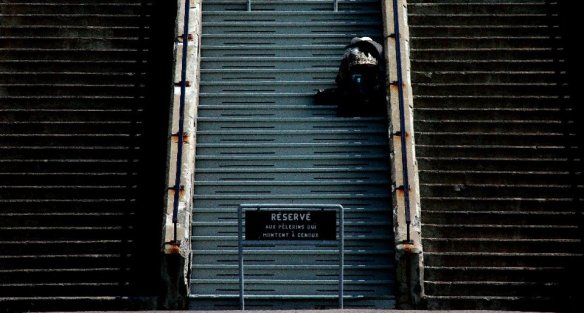A few years back I went on a trip to Montreal with some very close friends. It was a two-pronged pilgrimage focused on two of the things I love most in the world: beer and Catholicism.
 One of the best breweries in North America is located just outside of Montreal, in Chambly, Quebec. If you’ve never tasted the beer from Brewerie Unibroue, especially La Fin du Monde, then well, you’d better hop to it soon and improve your life dramatically. 96 out of 100 at Beer Advocate says it all about this Belgian Tripel. It’s amazingly good and sometimes I think it’s more Belgian than Belgium itself. If you ever go, make sure you drink Noire de Chambly too–you can’t get that in the States, which I think is a failure of international diplomacy. (Please write your senator.)
One of the best breweries in North America is located just outside of Montreal, in Chambly, Quebec. If you’ve never tasted the beer from Brewerie Unibroue, especially La Fin du Monde, then well, you’d better hop to it soon and improve your life dramatically. 96 out of 100 at Beer Advocate says it all about this Belgian Tripel. It’s amazingly good and sometimes I think it’s more Belgian than Belgium itself. If you ever go, make sure you drink Noire de Chambly too–you can’t get that in the States, which I think is a failure of international diplomacy. (Please write your senator.)
Besides being a mecca for beer lovers, Montreal has a long and vibrant tradition of Catholicism, stemming from it’s connection to France, “the eldest daughter of the Church.” My friends and I wanted to visit the Basilica of Notre Dame, renowned for its beauty and history. It’s a holy place and it provided refreshment to our souls the way beer provides refreshment to the body.
The highlight of our pilgrimage however was the Oratory of St. Joseph, built as the result of the personal mission and vision of St. Brother Andre. I won’t go into the details of that fantastic story, but the story of how God used this humble yet cantankerous and irascible man to establish a shrine to St. Joseph and bring about the physical healing of so many men and women is worth a read. What I find inspiring in his story is that the man became a saint, but seemed to have all sorts of challenges living the way he wanted to live a life filled with charity.
I take great comfort in knowing the saints all had issues that hounded them their entire life, and that’s one reason I’ve cultivated a devotion to St. Andre since my visit to the Oratory. He was a broken man, aware of his shortcomings. His story recalls the recent words of Pope Francis who described himself as “a sinner on whom the Lord has turned his gaze.” I can’t think of a better way to describe myself and all of us than in those words of Pope Francis.
I’ve been reading a biography of St. Andre and the idea that “we’re all broken” comes through his story loud and clear to me, which gives me hope for the journey. My favorite chapter of the biography is titled “Imperfections.” The author is pretty honest with St. Andre’s imperfections and this makes him real–and someone I can relate to and understand.
The opening lines of this great chapter resonate with how most of us I think are tempted to view the lives of the saints:
Some of the biographies of saints are very misleading in that they are written without the conviction that personality is real. When saints are cleared of every imperfection and of every vestige of human frailty and portrayed in anaemic narrative as rose-scented types of mortals, they are unreal and unnatural. When such perfection is contrasted with the vivid reality of life, it is neither fascinating nor stimulating. Bernadette Soubirous, in whom we discover more than one trait of resemblance to Brother Andre, had a better understanding of sanctity:
“Saints are presented to us as perfect beings, without shortcomings, without failings, without inconstancy, without a single blemish. They appear to be so holy that we are disheartened at seeing ourselves so far from such a state of perfection.”
In the battle to obtain the virtue of chastity and all of the other virtues this is comforting to me. Everyone who strives to live chastely, (whatever their state–whether single, in religious life, or in marriage) is going to find that battle difficult at times, and sometimes we’ll find ourselves failing. Knowing the saints struggled with their own particular imperfections is helpful for me to put all of the ups and downs of trying to live a virtuous life into perspective.
This section from Brother Andre’s biography is helpful:
God allowed [Brother Andre’s] failings as a powerful antidote against pride and as a reminder of his frailty. When the Lord singles out a man to accomplish an exalted mission, He guards him with special care against the seductions of vainglory. Hence in God’s elect souls the luster of sanctity is often eclipsed by some apparent weakness. It is well to keep this in mind that we many not misjudge Brother Andre.
Brother Andre apparently had a biting tongue from time to time and was never able to fully master himself in this regard. He apparently wasn’t always aware of it at the moment, but often upon reflection at the end of the day the author tells us that “sometimes, with tears flowing down his withered old cheeks, he would confide to a confrere: ‘Alas! I have again made someone cry.'” This is great comfort for anyone who has felt that parts of his or her life are uncontrollable. I remember certain addictions in my past which I seemed to have no hope of ever leaving behind and which lasted for years and years, as well as things in my life that frustrate me and hound me today. I’m often frustrated with myself and can relate to St. Paul’s famous line that he does that which he doesn’t want to do and doesn’t do what he wants to do. Brother Andre would sometimes say, “I am not satisfied with myself; I have again been impatient.” For people who battle for chastity, we need to take great comfort in the weaknesses of the saints, and realize that the saints grew frustrated with their efforts as well.
What all the saints had in common when such moments of frustration came is to realize that those moments of weakness were allowed by God for their good and for their sanctification, and allowed in part so that they might remember their complete need for God. I am keenly aware of the truth of what Thomas Merton wrote, that “real self-conquest is the conquest of the self by the Holy Spirit.” My desire to pursue chastity is motivated by grace that comes from the Holy Spirit, and any success I see is because I have been given the grace to cooperate with the grace that is offered. On days of failure, I reject the grace that is offered, and yet every failure is used by God to reveal once again my need for Him and as St. Paul says, is redeemed immeasurably, for where sin is, “grace abounds.”
The path to holiness and sanctity is a long journey, and one of the most frustrating aspects of the trip is that we don’t have control over the speed we travel towards the goal. That’s in God’s hands, and all we need to do is to keep trying and trying the rest of our lives. God isn’t so concerned with the failures as much as he is the repeated attempts at getting back up, and trying to walk in the right direction. We’re all broken, we’re all prone to making bad decisions, and our will is weak. I say to that, “thanks be to God,” for it’s then that I know most poignantly my utter need for God in my life. I don’t think there’s a more important lesson to be learned than that.
In closing, I find these words of Blessed Columba Marmion on our weakness being our strength consoling.
If we could only understand this mystery of our weakness being our strength! In the same way as poor beggars glory in their hideous sores and, far from hiding them, show them in order to attract the compassion of the charitable, so we ought to rejoice in the thought that we can do nothing without Jesus. Tell Him so often and be glad when the opportunity presents itself of feeling the depth of your misery and weakness. “The more you are confounded by the sense of your misery … the more I stoop down to embrace you in the power of My Love.
Ultimately, we’re all like this pilgrim, making her way up the 280 steps of the St. Joseph Oratory in Montreal, seeking solace for her soul. I like to think of this image when the path of chastity–the road less traveled–seems a bit overwhelming. It’s always just one more small step, best done on our knees, and the best perspective isn’t so much to focus on how far yet we’ve got to go, but rather to look back and see how far God has brought us.
At the same time, we need to remember that we don’t need to worry about making it to the destination. We’re only called to take one more step.
That’s doable.



I find the Bible refreshing in that it does not put a spin on Jesus’ disciples. For instance they show their zeal – wanting to bring down fire from heaven, often are afraid -scattering when Jesus was incarcerated, and like Thomas, have grave doubts about following Jesus. In other words, they’re like me. However, when the Spirit is sent down to them, they are changed men.
Righto–and seeing Peter deny Christ three times makes him honest and flawed. Which helps me too!
Another one of your finest pieces, Dan! The whole notion of our sin being the place where we meet God is so consoling, and seems to be, perhaps, Pope Francis’s predominant message. How much deeper and how much sweeter is our experience of love of God when we know His mercy in the face of our faults than how we might know him if we had it all together and required no mercy. Oh happy fault!
The Magnificat magazine reflection on October 13 came from Cardinal Bergogio’s 2001 address at a Buenos Aires book fair introducing Fr Luigi Giussani’s The Attraction that is Jesus. I was thinking of sending it to you via e-mail, but since you brought up the topic in this post, here is my excerpted rendition of this speech which speaks of the essence of what our Holy Father wants us to understand about Jesus and our sin:
Everything in our life, today, just as in Jesus’ time, begins with an encounter. An encounter with this Man, the carpenter of Nazareth, a man like all men and yet different. The first ones, John, Andrew, and Simon, felt themselves to be looked at into their very depths, read in their innermost being, and in them sprang forth a surprise, a wonder that instantly made them feel bound to Him, made them feel different.
When Jesus asked Peter, “Do you love Me?”, “his ‘Yes’ was not the result of an effort of will…; it was the emergence, the coming to the surface of an entire vein of tenderness and adherence that made sense because of the esteem he had for him … he couldn’t not say ‘Yes.’”
We cannot understand this dynamic of encounter which brings forth wonder and adherence if it has not been triggered…by mercy. Only someone who has encountered mercy, who has been caressed by the tenderness of mercy, is happy and comfortable with the Lord….I dare to say that the privileged locus of the encounter is the caress of the mercy of Jesus Christ on my sin.
In front of this merciful embrace…we feel a real desire to respond, to change, to correspond; a new morality arises….Christian morality is not a titanic effort of the will, the effort of someone who decides to be consistent and succeeds…. No. Christian morality is simply a response. It is the heartfelt response to a surprising, unforeseeable, “unjust” mercy… of one who knows me, knows my betrayals and loves me just the same, appreciates me, embraces me, calls me again, hopes in me, and expects from me. This is why the Christian conception of morality is a revolution; it is not a never falling down but an always getting up again.
Does it get more beautiful and powerful than that!?! How can we resist we running to Confession and meeting Him in his glorious and tender mercy? Almost makes you hope you never overcome your faults so that you will always be able to know that mercy. I suppose the good news is that no matter how hard we try, we never will overcome our faults, so we will need that mercy every day of our lives! Again: O happy fault!
Amen! That’s just fantastic!
So happy to see a post that includes my beloved city of Montreal 🙂